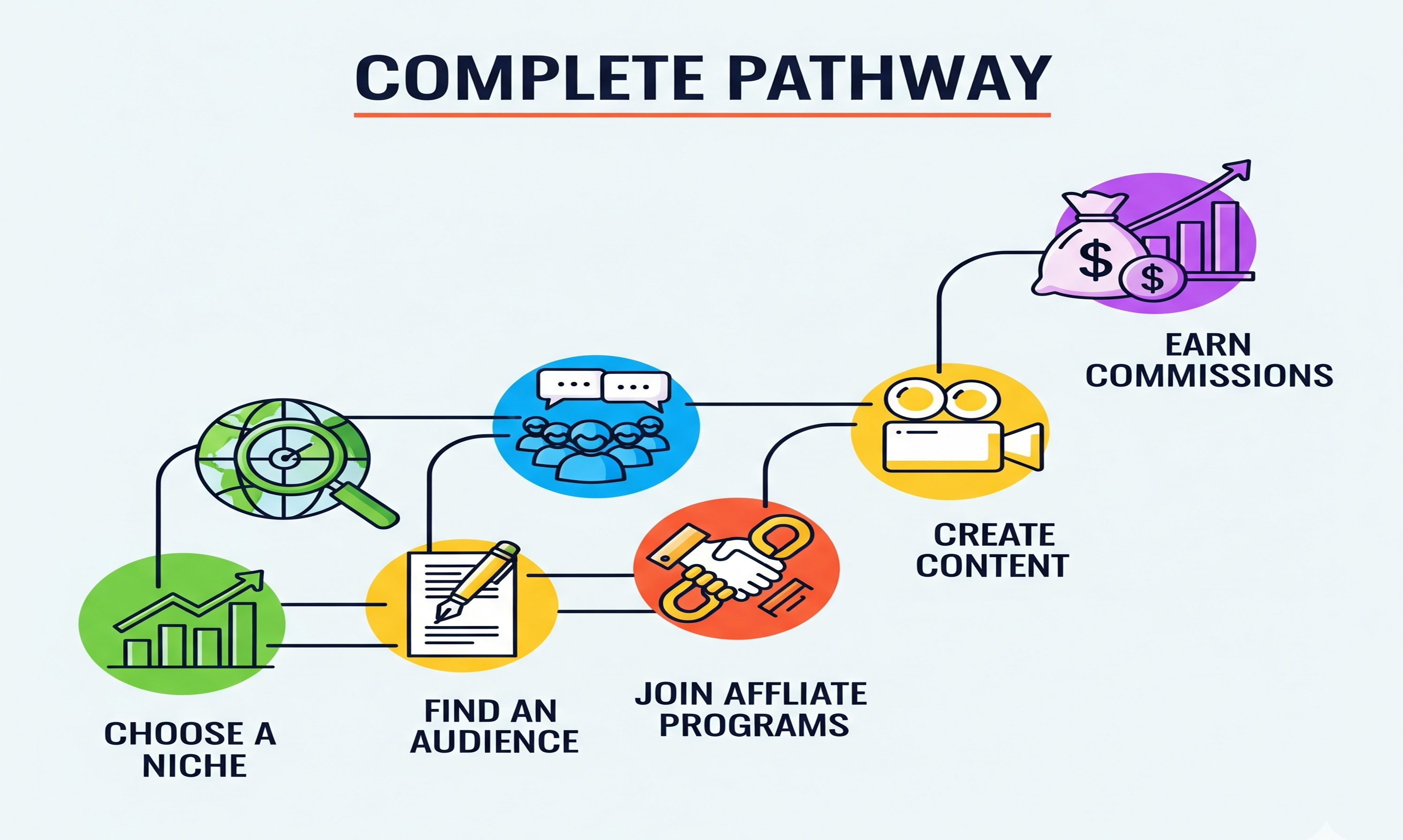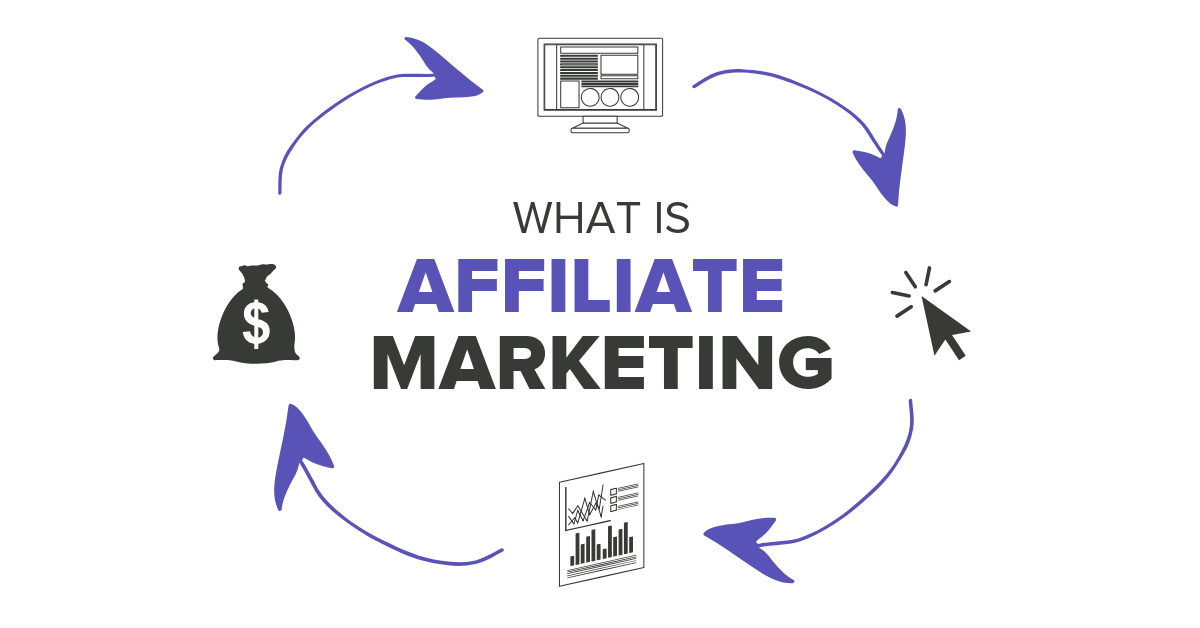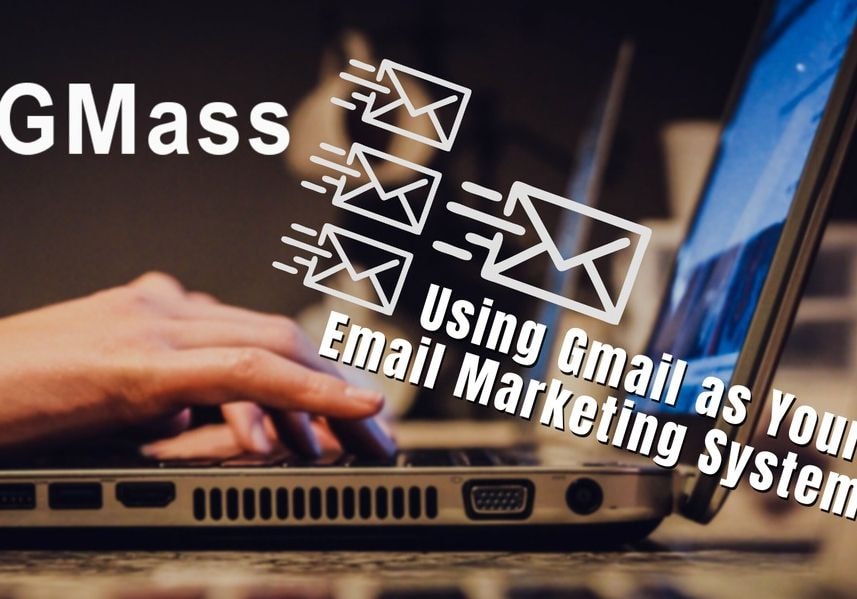A Complete Pathway to Start Your Affiliate Marketing Business in 2025

Share this article:
Reading time: 6 min read
The Concept That Led Me to Affiliate Marketing
I discovered the concept of affiliate marketing business just a year after I entered college. Yes, affiliate marketing is a real business. And that’s something most people do not tell you from the jump. College itself is a full-time commitment, and unlike a job, it doesn’t pay immediately. I needed a way to earn money while still staying on track to graduate on time. That’s when the idea of a commission-based marketing first came to my mind—long before I even knew the term “affiliate marketing.”
My first venture was simple yet effective. I noticed a real problem: many students didn’t have all the textbooks for their classes, so they often needed to photocopy chapters. I realized there was a clear demand—students wanted a cheaper, more convenient way to get the chapters they needed. I had access to roughly 200 students across four of my classes, which gave me a potential audience to help.
Instead of just using the service myself, I found a solution by approaching a photocopier on the campus. I asked, “If I bring 150 students to you, how much will you give me from your earnings?” At first, he laughed, but after some discussion, he agreed to give me 20 LRD for every 200 LRD transaction from the first 20 students. To make it even better for the students, I suggested reducing the cost per chapter by 10 LRD, selling them for 190 LRD instead of 200.
By connecting the students with the photocopier, I solved a real problem, created value for everyone involved, and earned my first 400 LRD in commission. This experience taught me the core principle of affiliate marketing and every other business: identify a need, find a solution, and create value for both sides.
This experience opened my eyes to the concept of affiliate marketing: earning commissions by helping others access products or services at a better value. Today, affiliate marketing has evolved into a thriving industry, offering creators and businesses significant opportunities. With the growth of e-commerce, it has become an effortless way to earn money while managing other commitments, just like I did in college.
Therefore, I want to encourage you to grab a copy of this affiliate marketing ebook from to begin your affiliate marketing business even if you are a beginner.
The beauty of affiliate marketing lies in its low barrier to entry. There are no startup costs, inventory, or shipping logistics to manage. As I stated earlier, all I had to do was to tell students where to get their chapters photocopy for 10$ less. According to a blog on shopify, You only need a platform and an audience that trusts your recommendations.
Many people begin affiliate marketing as a simple side hustle, but with consistency, it can grow into a full-time business.
What Is Affiliate Marketing?
Affiliate marketing is simply earning a commission by promoting products or services from other companies. In digital affiliate marketing, you get a unique tracking link. When someone clicks your link and makes a purchase, you earn a percentage of the sale.
The process is straightforward:
- Promote a product on your blog, social media, or website.
- A person clicks your unique affiliate link.
- They make a purchase on the company's site.
- The sale is tracked back to you.
- The company verifies the purchase.
- You receive your commission.
How to Get Started: A Step-by-Step Roadmap
Pick Your Niche
Your niche is your area of expertise—the topic you’ll focus on. Choose one that meets these criteria:
- Genuine interest: You’ll create a lot of content, so pick something you enjoy.
- Solves a problem: Offer value that helps people. For example, reviewing gear or skincare products.
- Market demand: Competition is actually a good sign—it shows there’s an audience and brands willing to pay commissions.
Be mindful: your passion alone might not always align with what’s profitable. I made a mistake of investing so much in passion than profitability. Do not make that mistake too. Therefore, pick a niche that balances interest and market demand.
Choose Your Platform
Decide where you’ll connect with your audience:
- Blogs: Ideal for in-depth reviews, comparisons, and guides. This is what I chose because I love writing. Before I started writing blog posts, I was writing poems and short plays. Though I was not writing them for money, they were not ideal for business in my views, so I channeled that my writing energy into something that was more profitable.
Social media: Instagram and TikTok are great for visually showcasing products.- YouTube: Video content allows deeper engagement and trust.
Choose the platform where you can create authentic content consistently. Authenticity builds trust—the foundation of affiliate marketing.
Find the Right Programs
Selecting the right affiliate programs is key:
- Reputable brands: Only work with companies your audience trusts.
- Fair commission rates: Look for programs that reward your effort appropriately.
- Cookie duration: Longer durations (30+ days) give you more time to earn from a click.
You can join affiliate networks like Shopify Collabs, Rakuten, Amazon Associates, Digitstore 24 or reach out to brands directly.
Create Valuable Content
Offer content that genuinely helps your audience. Avoid aggressive sales pitches. Integrate affiliate products naturally:
If you’re a fitness creator, showcase workout gear while demonstrating routines.
Write blog posts that provide solutions, not just links. Your content should be engaging even without affiliate links—it’s the value that builds trust.
- Build an Audience
- Growing an audience takes patience and consistency:
- Bloggers: Start an email list early—it’s a reliable way to reach your audience.
- Social media creators: Collaborate with peers and engage followers to create a community.
An engaged audience of a few thousand who trust you can be more profitable than a million followers who don’t.
Follow Disclosure Rules
Transparency isn’t just good practice—it’s often required by law. Always disclose affiliate links:
“This post contains affiliate links.”
“I may earn a commission from purchases made through these links.”
Being upfront builds trust and credibility with your audience.
Earning Potential and Benefits
Affiliate marketing offers real earning potential. While most new affiliates earn less than $10,000 annually, many earn over $100,000 as they grow their traffic and audience trust.
The biggest benefit? Passive income. Once your content is live, affiliate links can generate commissions around the clock. This low-risk model allows experimentation across products and niches until you find what works. Affiliate marketing also helps you understand your audience’s needs. Over time, you can pivot from recommending products to creating and selling your own, turning your affiliate business into a sustainable, long-term venture.
Until we meet again, cheers to your success in whatever you want to achieve!





